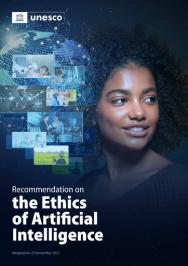This landmark text defines values, principles and policies that will guide countries in building legal frameworks to ensure that AI is deployed as a force for the common good.

AI already pervades the daily lives of billions of people. It personalizes our news feeds. It informs the decisions of governments, companies, doctors, judges and many more. AI has enormous potential. It enables disaster preparedness and recovery. It has been crucial in our management of the COVID-19 pandemic and is delivering remarkable results in cancer screening. AI can also help build inclusive environments for people with disabilities and can be put to work to combat climate change. But this cutting-edge technology is also posing unprecedented ethical dilemmas. We are seeing lack of transparency, gender and ethnic bias, grave threats to privacy, dignity and agency, the danger of mass surveillance, and a growing use of unreliable AI technologies in law enforcement, to name a few.
The newly-adopted Recommendation tackles these issues.
The world needs rules for artificial intelligence to benefit humanity, and the UNESCO Recommendation is a major answer.

Decisions impacting millions of people should be fair, transparent and contestable.
The text seeks to promote AI’s promise and reduce its risks. It addresses transparency, accountability and privacy in action-oriented policy chapters on data governance, education, culture, labor, healthcare and the economy.
Among its salient points, the Recommendation stresses data protection, calling for more action from regulatory bodies. It bans as invasive the use of AI systems for social scoring and mass surveillance. It proposes tools to help countries assess the impact of AI systems on individuals. And it calls for AI that is environment friendly.
UNESCO’s work on AI spans standard setting, policy advice and capacity building. As part of it, UNESCO has launched guidance for policy-makers in AI and education, developed training for youth on AI and human rights, and in 2022 will be training over 2,000 judicial operators worldwide on AI and the rule of law.
The Recommendation mandates UNESCO to produce an Ethical Impact Assessment and a Readiness Methodology, as well as policy analysis to advance implementation. While Member States will be responsible for its application at the national level, UNESCO will support their implementation processes and require regular reports on their policies and practices.
In September 2021, UNESCO launched Globalpolicy.AI, a portal of the global observatory it created in cooperation with seven international organizations working on different facets of AI.









